Related Research Articles

Hartmann Schedel was a German historian, physician, humanist, and one of the first cartographers to use the printing press. He was born and died in Nuremberg. Matheolus Perusinus served as his tutor.
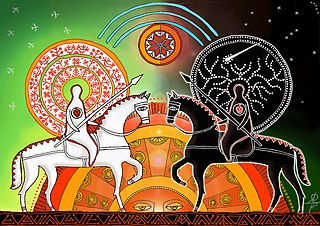
Chernobog and Belobog are an alleged pair of Polabian deities. Chernobog appears in the Helmold's Chronicle as a god of misfortune worshipped by the Wagri and Obodrites, while Belobog is not mentioned – he was reconstructed in opposition to Chernobog. Both gods also appear in later sources, but they are not considered reliable. Researchers do not agree on the status of Chernobog and Belobog: many scholars recognize the authenticity of these theonyms and explain them, for example, as gods of good and evil; on the other hand, many scholars believe that they are pseudo-deities, and Chernobog may have originally meant "bad fate", and later associated with the Christian devil.
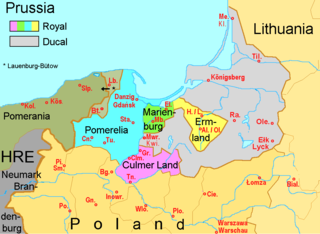
Pomerelia, also known as Eastern Pomerania, Vistula Pomerania, prior to World War II also known as Polish Pomerania, is a historical sub-region of Pomerania on the southern shore of the Baltic Sea. The designation of Gdańsk Pomerania, is largely coextensive with Pomerelia, but slightly narrower, as it does not cover the Chełmno Land.

Wawrzyniec Goślicki was a Polish nobleman, Bishop of Poznań (1601–1607), political thinker and philosopher best known for his book De optimo senatore (1568).

Institutes of the Christian Religion is John Calvin's seminal work of systematic theology. Regarded as one of the most influential works of Protestant theology, it was published in Latin in 1536 and in his native French language in 1541, with the definitive editions appearing in 1559 (Latin) and in 1560 (French).
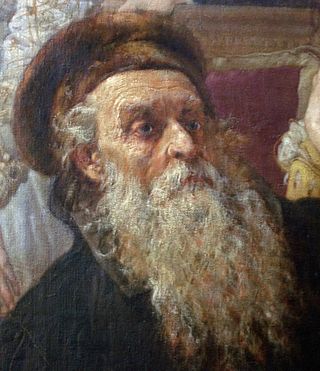
Andrzej Frycz Modrzewski was a Polish Renaissance scholar, humanist and theologian, called "the father of Polish democracy". His book De Republica emendanda was widely read and praised across most of Renaissance Europe, influencing thinkers such as Jean Bodin, Hugo Grotius and Johannes Althusius.
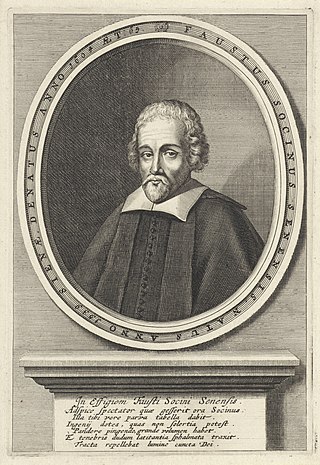
Fausto Paolo Sozzini, or simply Fausto Sozzini (Latin: Faustus Socinus, was an Italian Renaissance humanist and theologian, and, alongside his uncle Lelio Sozzini, founder of the Nontrinitarian Christian belief system known as Socinianism. His doctrine was developed among the Polish Brethren in the Polish Reformed Church between the 16th and 17th centuries, and embraced by the Unitarian Church of Transylvania during the same period.

Michael Sendivogius was a Polish alchemist, philosopher, and medical doctor. A pioneer of chemistry, he developed ways of purification and creation of various acids, metals and other chemical compounds. He discovered that air is not a single substance and contains a life-giving substance—later called oxygen—170 years before Scheele's discovery of the element. He correctly identified this 'food of life' with the gas given off by heating nitre (saltpetre). This substance, the 'central nitre', had a central position in Sendivogius' schema of the universe.
Jerzy Wojciech Łukaszewski was a Polish and Belgian academic and diplomat. He lived in Belgium from 1960 on, where he taught at the College of Europe in Bruges from 1961 and served as its rector from 1972. From 1990 to 1996, he was Polish ambassador to France.

Ferenc Dávid was a Unitarian preacher and theologian from Transylvania, the founder of the Unitarian Church of Transylvania, and the leading figure of the Nontrinitarian Christian movements during the Protestant Reformation. He disputed the mainstream Christian doctrine of the Trinity, believing God to be one and indivisible.

Piotr of Goniądz was a Polish political and religious writer, thinker and one of the spiritual leaders of the Polish Brethren.
Thrasco was the Prince (knyaz) of the Obotrite confederation from 795 until his death in 810. He succeeded his father, Witzlaus II, who had been ambushed and killed by the revolting Saxons. Thrasco defeated the Saxons in the battle on Schwentine River in 798. He was murdered in Reric in 810. Thrasco had a son, Cedragus, the Obotrite prince from 819 to 826.

Jan Sokol was a Czech philosopher, dissident, politician and translator. He briefly served as Minister of Education, Youth and Sports in 1998 under Prime Minister Josef Tošovský. From 1990 to 1992 he was Member of Parliament for Prague. From 2000 to 2007 he served as the first dean of the Faculty of Humanities at Charles University in Prague. Sokol ran for President of the Czech Republic in the 2003 election but lost to Václav Klaus.
Miroslav Marcovich was a Serbian-American philologist and university professor.

Jacob Palaeologus or Giacomo da Chio was a Dominican friar who renounced his religious vows and became an antitrinitarian theologian. An indefatigable polemicist against both Calvinism and Papal Power, Palaeologus cultivated a wide range of high-placed contacts and correspondents in the imperial, royal, and aristocratic households in Eastern Europe and the Ottoman Empire; while formulating and propagating a radically heterodox version of Christianity, in which Jesus Christ was not to be invoked in worship, and where purported irreconcilable differences between Christianity, Islam, and Judaism were rejected as spurious fabrications. He was continually pursued by his many enemies, repeatedly escaping through his many covert supporters.
Martin Seidelius was a Polish Unitarian.
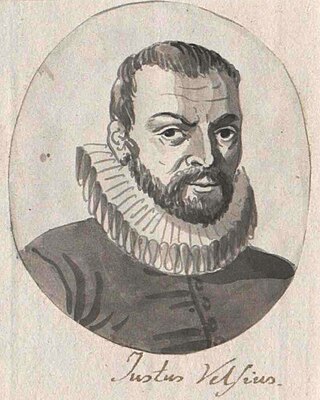
Justus Velsius, Haganus, or Joost Welsens in Dutch, was a Dutch humanist, physician, and mathematician.

Ludwig Camerarius was a German statesman, lawyer, minister and head of Frederick V's government-in-exile in the Hague. He also served Swedish interests later in his life. He was the son of the scholar Joachim Camerarius the Younger and grandson of Joachim Camerarius the Elder.
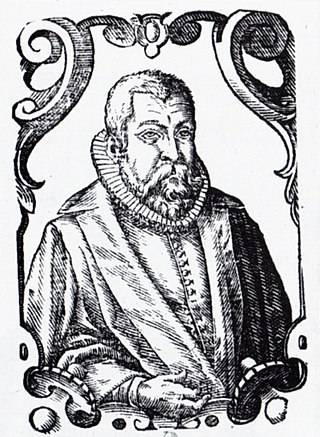
Otto Walper was a German theologian and philosopher.
Stefan Karol Jakobielski is a Polish historian, archaeologist, philologist, epigraphist. One of the pioneers of nubiology. He participated in archaeological research in Faras, Tell Atrib, Palmyra, Deir el-Bahari and Qasr Ibrim; directed the archaeological works at Old Dongola.
References
- ↑ Otto Henne am Rhyn Kulturgeschichte der neuern Zeit: vom Wiederaufleben d. Wiss. bis Reformation 1870 "Im Jahre 1577 entwich der Professor Christian Franken aus ... zu Wien, wurde Protestant und schleuderte von Basel und La Rochelle aus zahlreiche Streitschriften gegen den Orden,..."
- ↑ Théodore de Bèze ed. Hippolyte Aubert, Fernand Aubert, Henri Meylan Correspondance de Théodore de Bèze: 1590
- ↑ Robert Wallace, Sketches of the lives and writings of distinguished antitrinitarians
- ↑ Dee Diary p42
- ↑ Leandro Perini La vita e i tempi di Pietro Perna
- ↑ Jesús Martínez de Bujanda, Index de Rome 1590, 1593, 1596: avec étude des index de Parme 1580 ..., Volume 9 "Christian Francken est condamné comme auteur supra, Munchen, 1582"